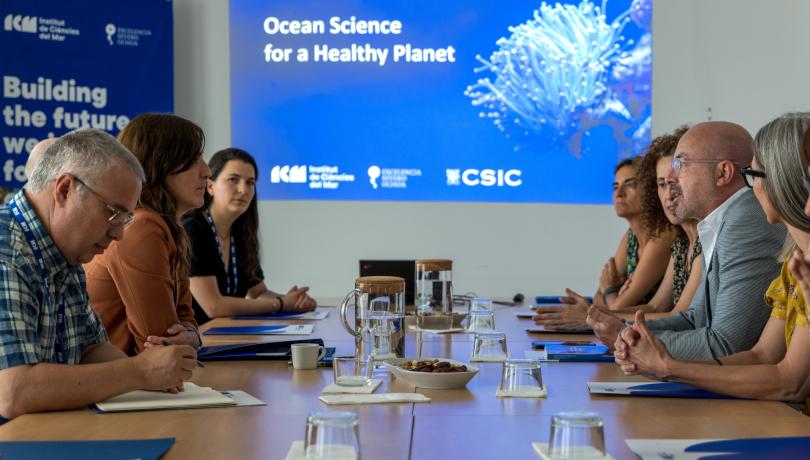The councillor learned in detail about ICM's scientific and social strategy and visited two key infrastructures for marine research.

The Councillor of Research and Universities of the Government of Catalonia, Núria Montserrat, visited the Institute of Marine Sciences (ICM-CSIC) today as part of an institutional meeting aimed at learning first-hand about the scientific activity and social impact of this leading center in the field of marine sciences.
Montserrat was welcomed by the director of ICM-CSIC, Valentí Sallarès, and the institutional delegate of CSIC in Catalonia, Lluís Calvo, who accompanied her throughout the visit. Members of the center’s management team also took part in the visit, including Marta Vendrell, general manager; Eva Calvo, deputy director of scientific strategy; Antonio Villaseñor, deputy director of social impact; Elisabetta Broglio, associate deputy director of scientific culture and citizen engagement; Sònia Sagristà, coordinator of institutional development; and Clara R. Solé, head of institutional relations.
The day began with an institutional session at the Josefina Castellví Hall, where the councillor received detailed information about the center’s strategic lines, its interdisciplinary research model, and its commitment to knowledge transfer and scientific culture. In this context, the recent renewal of the Severo Ochoa Center of Excellence accreditation was highlighted, recognizing ICM’s scientific excellence and leadership at both national and international levels. The session placed special emphasis on ICM’s role in promoting a transformative ocean culture and its contribution to the Sustainable Development Goals, an approach also embodied in the Mar de Ciència (Sea of Science) program—an ICM strategic initiative to foster co-creation and dialogue between science and society.
One of the highlights of the visit was the tour of two of the center’s most emblematic facilities: the Electron Microscopy Service and the Aquarium and Experimental Chambers Area. The former provides essential tools for observing marine microorganisms and their structures, with applications ranging from cell biology to marine ecology. The latter, with more than 650 m² and over 150 aquariums, is one of the most advanced infrastructures in the Mediterranean for simulating marine habitats and studying species under controlled environmental conditions.
"Marine research is essential to addressing the major challenges of our time, from climate change to food security," emphasized Valentí Sallarès during his presentation. "That’s why it’s crucial to strengthen relationships with public administrations to ensure evidence-based decision-making, and to promote active collaboration with citizens," he added.
With this visit, Councillor Montserrat aimed to recognize the trajectory and scientific contribution of the Institute of Marine Sciences, as well as to reaffirm the Government's commitment to the Catalan research system and to the international projection of science produced in Catalonia.